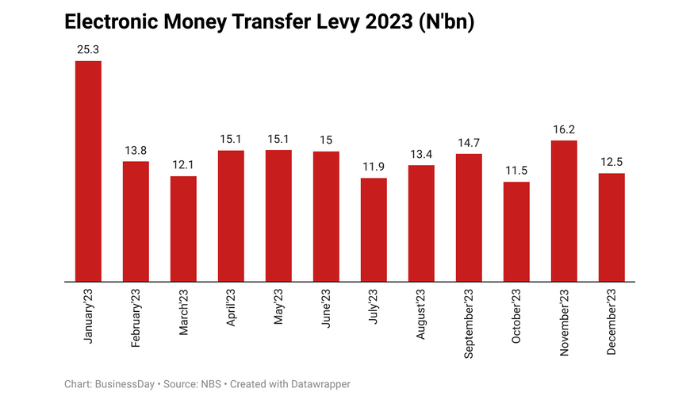Nigerians paid N180.31 billion as Electronic Money Transfer Levy (EMTL) in 2023.
This tax was a 29.45 percent increase from the N136.35 billion target of the government for the year. This was revealed by a BusinessDay analysis of data from the National Bureau of Statistics’ Federation Account Allocation Committee reports for 2023.
The growth in EMTL was backboned by a surge in electronic transactions in the country in the year under review.
Read also: Number of active bank accounts rises to 151 million — NIBSS
Electronic transfers grew by 54.55 percent year-on-year to N611.06 trillion in 2023, recent statistics from the Nigeria Interbank Settlement System revealed.
EMTL was introduced in the Finance Act 2020 and was an amendment to the Stamp Duty Act to tap into the growth of electronic transfers in the country. It is a single, one-off charge of N50 on electronic receipt or transfer of money deposited in any deposit money bank or financial institution on any type of account on sums of N10,000 and above.
It was recently extended to foreign transactions. In a recent communication with its customers, Access Bank said, “Previously, the Electronic Money Transfer Levy was solely applicable to accounts receiving electronic deposits of N10,000 and above or its equivalent. However, starting January 2, 2024, the deduction will be extended to FCY inflows equivalent of N10,000 and above, incurring a charge of N50 (FCY equivalent).”
Revenue from EMTL is shared among the three tiers of government. A BusinessDay breakdown of the data showed that the government recorded N25.33 billion from EMTL in January, N13.80 billion in February, N12.13 billion in March, N15.09bn in April, N15.12 billion in May, N14.97 billion in June, N11.91 in July, N13.37 billion in August, N14.69 billion in September, N11.45 billion in October, N16.20 billion in November, and N12.45 billion in December.
The Federal Government is now on track to make its target of N483.73bn in three years from the electronic payment boom by way of EMTL. This projection was made by the Budget Office of the Federation and revealed in the 2023 – 2025 Medium Term Expenditure Framework and Fiscal Strategy Paper.
The government intends to make at least N137.03bn (which it has now surpassed) in 2023, N157.59bn in 2024, and N189.11bn from EMTL.
This growth is to be fueled by further increases in cashless transactions in the country, especially with the Central Bank of Nigeria anticipating the slowdown of cash usage in the country by 2025.
“The use of cash will naturally slow with the ‘mobile first generation’, which will be economically active by 2025, hence one of the focuses of the PSV 2025 is enhancing the cashless policy of the CBN,” the bank said in its ‘Payments Vision 2025’ document.
Read also: Here are factors that will shape banking sector in 2024 Agusto and Co
Commenting on the government’s projection, the former National President, Association of Mobile Money Agents in Nigeria, Victor Olojo, in a post by the Nigeria Interbank Settlement System, said, “Yes it will continue to increase with the boom. From what I know about the levy, it is a stamp duty championed by the Nigerian Postal Service for the Federal Government.
“It is a huge meaningful source of revenue to them, although it might not be as significant. For every transaction above N10,000 that enters your account, stamp duty is automatically deducted. It is a big win for the Federal Government.”


